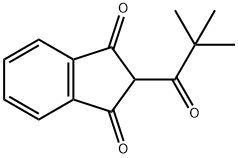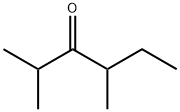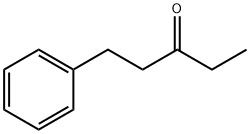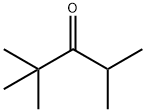S9734148
Pindone , PESTANAL?,analyticalstandard , 83-26-1
Synonym(s):
1,3-Dioxo-2-pivaloylindan;2-Pivaloyl-1,3-indandione;2-Trimethylacetyl-1,3-indandione;Pindone
CAS NO.:83-26-1
Empirical Formula: C14H14O3
Molecular Weight: 230.26
MDL number: MFCD00021230
EINECS: 201-462-8
Update time: 2022-07-08
PRODUCT Properties
| Melting point: | 108-110° |
| Boiling point: | 312.25°C (rough estimate) |
| Density | 1.1914 (rough estimate) |
| refractive index | 1.5557 (estimate) |
| storage temp. | APPROX 20°C |
| solubility | Soluble in most organic solvents (Worthing and Hance, 1991) |
| pka | 3.47±0.10(Predicted) |
| color | Bright yellow crystals |
| Water Solubility | 18 ppm at 25 °C (Gunther et al., 1968) |
| Merck | 13,7526 |
| BRN | 2051258 |
| Exposure limits | NIOSH REL: TWA 0.1 mg/m3, IDLH 100 mg/m3; OSHA PEL: TWA
0.1 mg/m3; ACGIH TLV: TWA 0.1 mg/m3 |
| EPA Substance Registry System | Pindone (83-26-1) |
Description and Uses
Insecticide; rodenticide
Safety
| Symbol(GHS) |    GHS06,GHS08,GHS09 |
| Signal word | Danger |
| Hazard statements | H301-H372-H410 |
| Precautionary statements | P260-P264-P270-P273-P301+P310-P314 |
| Hazard Codes | T,N |
| Risk Statements | 25-48/25-50/53 |
| Safety Statements | 37-45-60-61 |
| RIDADR | 3027 |
| OEB | D |
| OEL | TWA: 0.1 mg/m3 |
| WGK Germany | 3 |
| RTECS | NK6300000 |
| HazardClass | 6.1(b) |
| PackingGroup | III |
| HS Code | 29143990 |
| Hazardous Substances Data | 83-26-1(Hazardous Substances Data) |
| Toxicity | LD50 orally in male rats: 280 mg/kg (Gaines) |
| IDLA | 100 mg/m3 |




